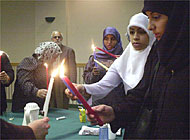
Muslims in Switzerland fear revenge over US attacks

Many Muslims living in Switzerland say they are fearful of walking the streets following the terrorist attack on the United States. Their fears were heightened when US officials pointed the finger of blame at the Saudi dissident, Osama bin Laden.
“I am afraid to go shopping alone now,” Halida Hatipoglu, a Muslim living in Zurich told swissinfo. “I wear the traditional headscarf so people can see I’m a Muslim and I’m worried that I might experience physical or verbal abuse.”
Cases of violent retaliation, including hate mail and death threats, have been reported not just in America, but as far afield as Australia. Muslims in Europe, too, are complaining of blanket condemnation as attention focuses on Islam and fundamentalists’ alleged scheming to bomb America.
“Though Switzerland is usually a safe country, we feel that the atmosphere is very bad and so for the Muslim minority here, life is not as it was before the attacks,” said Hatipoglu’s husband, Taner, who is the vice-president of Zurich’s Union of Islamic Organisations.
George Kreis, president of the Federal Commission Against Racism believes that there will not be a strong backlash against the Muslim community in the country.
“Unfortunately there is always a danger of a backlash and especially against Muslim minorities. But I think this type of reaction won’t be very intensive in Switzerland and it shouldn’t lead to any extreme forms of violence,” Kreis told swissinfo.
Uneasy relations
Uneasy relations between the Swiss and Muslim immigrant population have caused the government concerns in the past. Kreis explains that the 200,000-strong Muslim community has yet to be fully integrated into Swiss society.
“I think there is a type of co-existence and it’s a precarious situation of course,” he said.
A report published last year found that the Muslim community is seen in a negative light by many people who tend to confuse Muslims with Islamic fundamentalism.
“We in Switzerland have the regrettable tendency to misunderstand the Islamic world as a monolithic block of fundamentalists,” Kreis told swissinfo. “It is important not to generalise about the large majority of ordinary Muslim people who can in no way be regarded in the same way as extremists.”
No cases of abuse
Fatima Kempf, a Moroccan Muslim living in Geneva, is defiant in the face of anti-Muslim sentiment.
“I don’t feel vulnerable and I don’t feel ashamed of being a Muslim,” Kempf told swissinfo. “I am ashamed for what they [suspected Islamic terrorists] did in the name of Islam. This I condemn. But if somebody approaches me in the street and says ‘See what the Muslims have done?’ I will ask him about the conflict between Catholics and Protestants in Northern Ireland and the violence committed in the name of religion.”
Although no cases of abuse in Switzerland have been reported to date, Swiss President Moritz Leuenberger cautioned that an effort had to be made to curb religious intolerance.
“We must fight against inequality and religious hatred,” he said in a newspaper interview. “If we want an enduring peace, then we have to learn to live together in a world of those who are rich, and those who have nothing left to lose.”
The Swiss Muslim League on Friday issued a statement saying the community was “shocked” by the attacks and that “such a degree of violence must be denounced and condemned”.
The statement went on to say that the acts are deemed unacceptable to the Swiss Muslim community who are faithful to their religion which is founded on a message of love, brotherhood and peace.
Islamic states condemn assault
Islamic states Pakistan, Afghanistan, Iran, Libya and Jordan all moved swiftly to condemn the assault on the World trade Center and the Pentagon. Afghanistan’s ruling Taliban movement also condemned the attacks and denied that bin Laden was involved.
“We are very hurt that already the people are saying the masterminds came from a terrorist group based in a Muslim country. And this doubles our bad feelings and generates additional pain,” said Taner Hatipoglu.
“Because suddenly we feel responsible for what happened there and this is additional bad feeling on top of what we feel as a human being.”
by Samantha Tonkin

In compliance with the JTI standards
More: SWI swissinfo.ch certified by the Journalism Trust Initiative

























You can find an overview of ongoing debates with our journalists here . Please join us!
If you want to start a conversation about a topic raised in this article or want to report factual errors, email us at english@swissinfo.ch.